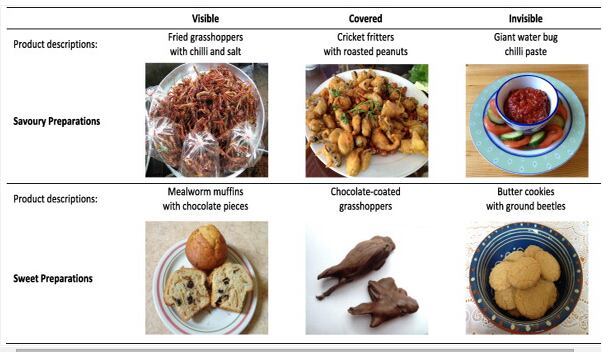Researchers from the University of Wageningen explored to what extent positive and negative perceptions of eating insects stem from cultural exposure or psychological individual preferences in Thai and Dutch subjects.
They found that because sustainability was the main driver for eating insects in the West, acceptance among Dutch participants was greater when the end product matched up with these ethical motivations.
In other words, chocolate-coated crickets were less popular than spicy, salted grasshoppers because insects have been plugged as a sustainable alternative to meat in the West, and sweets are generally not eaten to provide protein.
Other Dutch subjects said that the visual appearance of insects worked for savoury products but not sweet.
Sweet products tended to fare better when ground insects were used, normalising the use of insects by using them as flour, a standard bakery ingredient. Mealworm muffins - where the worms were textured and visible - did not go down as well as a ground beetle butter cookie.

When offered the mealworm muffins, one Dutch participant commented: “Why should there be insects in muffins and cookies anyway? If they put minced meat in there, then it would also look rather strange.”
In order to sell insects in the West, therefore, manufacturers should ensure that extrinsic motivating factors match up with intrinsic sensory expectations.
While concerns for sustainability and the environment were sufficient to pique consumer interest in insects, it was not enough in itself to ensure they become an everyday item on the shopping list, the researchers said.
“The cognitive arguments (e.g. health and environmental benefits) were found to be insufficient to encourage consumption, and acceptance of insects as food would require the development of appropriate products that not only lower the barriers to trying, but also taste good and deliver the benefits that consumers are interested in,” they wrote.
“Cultural exposure created expectations of which species were more appropriate to eat and how they should be prepared, whereas individual experiences determined whether judgements were made based on memories of past eating experiences or based on the visual properties and item associations."
Cultivate curiosity to bring down barriers
The researchers formed four discussion groups to explore different attitudes – Dutch ‘insect eaters’ (who had previously tried insects on holiday or who were willing to try), Dutch non-eaters (those who had never tried, did not want to try or were vegetarian), Thai eaters and Thai non-eaters (who, in general, had tried insects before but did not like the taste or were allergic).
All the Dutch participants were familiar with the concept of eating insects, either through media coverage, reality television or travelling - and familiarity is crucial to normalising novel foods, said the researchers.
“Although trying did not signify liking, it is a necessary first step to learning to like a food, where increased exposure to positive experiences with an unfamiliar food could improve its acceptance,” concluded the authors.
Furthermore most of the participants ended up trying the insects due to curiosity - even if they did not expect to enjoy the taste.
However, even those who liked the taste said they were still not ready to eat insects as part of their regular diet - but the barriers cited included practical reasons such as cost and availability and not negative sensory expectations or experiences.
The FAO has said insects could be a more widely consumed sustainable food source, producing reports and publishing infographics on social media in a bid to arouse curiosity and increase acceptance.
Source: Food Quality and Preference Journal
Published online ahead of print Volume 42, June 2015, Pages 78–89, doi:10.1016/j.foodqual.2015.01.013
"Insects as food: Exploring cultural exposure and individual experience as determinants of acceptance"
Authors: H. S. Grace Tan, A. Fischer, P. Tinchan et al.
